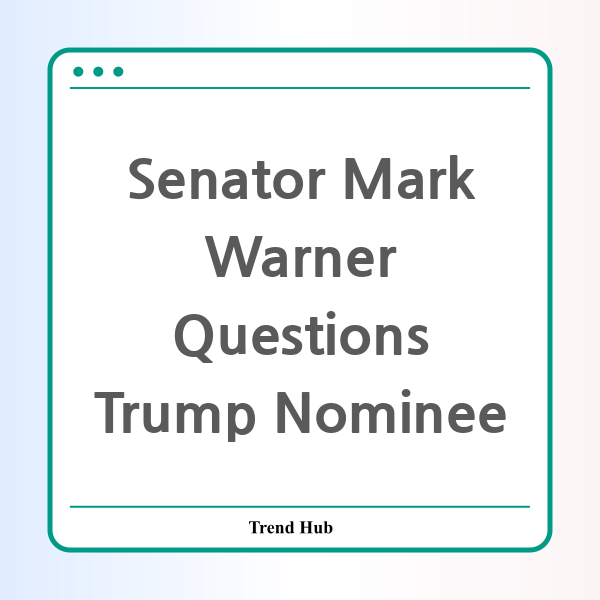* This website participates in the Amazon Affiliate Program and earns from qualifying purchases.

In a dynamic political landscape, Senator Mark Warner of Virginia is making headlines as he takes a firm stand against President Donald Trump’s nominee for the Department of Health and Human Services, Robert F. Kennedy Jr. This emerging conflict has raised critical questions about health policy, employee welfare, and the direction of healthcare funding. So what’s at stake, and why should federal employees be concerned?
Senator Warner recently challenged Kennedy during his confirmation hearing, emphasizing the need for caution among federal employees considering a deferred resignation in light of Trump's recent offer. Warner posed a crucial question that echoes a greater concern about job security and leadership integrity: "Has this individual in his business world ever fulfilled his contracts or obligations to any workers in the past?" This question not only highlights Warner’s skepticism about Kennedy’s professional background but also serves as a warning for federal employees to think critically before making career-altering choices.
The stakes are raised even higher when one considers Kennedy’s controversial history, particularly his unfounded claims regarding vaccines, which have been widely debunked by health experts. His promotion of potentially dangerous practices, such as drinking bleach, has further amplified concerns about his suitability for a role that influences public health policy. Warner's insistence on transparency came to a head when he pressed Kennedy on his commitment to not firing federal workers dedicated to food safety—a crucial issue for maintaining public health standards.
Throughout the hearing, Warner displayed a determined approach, demanding straightforward answers from Kennedy. His assertive questioning not only reflects his own principles but also underscores a broader concern regarding the future of healthcare funding and services. Warner explicitly voiced doubts about Kennedy's understanding of essential healthcare issues, stating, "He has no idea where he is going to cut. Is he going to cut the researchers at NIH just because they work on a vaccine that he doesn't like?" Such remarks suggest a potential threat to vital healthcare initiatives that support research and safeguard public health.
Warner's criticism of Kennedy’s nomination indicates a larger narrative in U.S. politics today, where public health becomes a politicized issue. His vocal opposition to the nominee reflects a culmination of fears regarding the direction of health policies under a Trump administration, particularly concerning budget cuts that could adversely affect vital programs like Medicaid. Warner’s perspective resonates with many who advocate for evidence-based policies and the protection of public health services—issues that could be compromised under Kennedy's leadership.
This political drama does not just impact the immediate parties involved; it reverberates through the lives of federal employees and the communities they serve. As Warner highlights the implications of leadership choices, it becomes clear that the decisions made today could have lasting effects on job security, healthcare access, and the overall integrity of the Department of Health and Human Services.
As the confirmation process unfolds, federal employees, healthcare professionals, and the public must stay informed and engaged. Warner’s staunch resistance against Kennedy’s nomination is a call to action, urging all stakeholders to consider the broader implications of such appointments and to advocate for leaders who prioritize public health and employee welfare above all.
In conclusion, Senator Mark Warner’s role in challenging Robert F. Kennedy Jr. not only sheds light on the intricacies of healthcare funding and leadership but also serves as a vital reminder for federal employees to critically evaluate their options in a changing political climate. The message is clear: think twice before making decisions that could impact your career and the welfare of the public.
* This website participates in the Amazon Affiliate Program and earns from qualifying purchases.